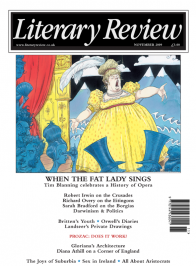Richard Barber
Annus Mirabilis
1415: Henry V’s Year of Glory
By Ian Mortimer
The Bodley Head 640pp £20
Historians seem to be undergoing some kind of crisis of confidence at the moment, particularly when it comes to presenting their work to the public. There are two opposing trends that dominate the publishing industry – towards a handful of highly promoted bestsellers at one extreme, and towards the book printed on demand at the other. As to bestsellers, only big subjects and popular writers are seen as viable. Of the ten or so books I have reviewed in the last two years, two have been by Ian Mortimer, two have been on the Black Death, and two have been on Agincourt. The middle ground, where so much excellent work used to appear, has vanished. Many well-written and well-presented titles will not now find a place on the bookshop shelves. These were often books of high academic standards, by professional historians, who were also elegant and approachable writers.
In the last month, Antony Beevor attacked the result of these trends in The Guardian, saying that ‘entertainment history is now the main source of supposedly historical knowledge for more and more people’, while Nigel Saul, professor of history at Royal Holloway College, reviewing a fairly dire work

Sign Up to our newsletter
Receive free articles, highlights from the archive, news, details of prizes, and much more.@Lit_Review
Follow Literary Review on Twitter
Twitter Feed
How to ruin a film - a short guide by @TWHodgkinson:
Thomas W Hodgkinson - There Was No Sorcerer
Thomas W Hodgkinson: There Was No Sorcerer - Box Office Poison: Hollywood’s Story in a Century of Flops by Tim Robey
literaryreview.co.uk
How to ruin a film - a short guide by @TWHodgkinson:
Thomas W Hodgkinson - There Was No Sorcerer
Thomas W Hodgkinson: There Was No Sorcerer - Box Office Poison: Hollywood’s Story in a Century of Flops by Tim Robey
literaryreview.co.uk
Give the gift that lasts all year with a subscription to Literary Review. Save up to 35% on the cover price when you visit us at https://literaryreview.co.uk/subscribe and enter the code 'XMAS24'